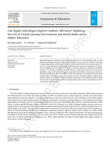Can digital technologies improve students' efficiency? Exploring the role of Virtual Learning Environment and Social Media use in Higher Education
| dc.contributor.author | Lacka, E | |
| dc.contributor.author | Wong, TC | |
| dc.contributor.author | Haddoud, Mohamed Yacine | |
| dc.date.accessioned | 2021-01-04T15:41:04Z | |
| dc.date.available | 2021-01-04T15:41:04Z | |
| dc.date.issued | 2021-04 | |
| dc.identifier.issn | 0360-1315 | |
| dc.identifier.issn | 1873-782X | |
| dc.identifier.other | 104099 | |
| dc.identifier.uri | http://hdl.handle.net/10026.1/16778 | |
| dc.description.abstract |
Digital technologies, including Virtual Learning Environment (VL) and Social Media (SM), are well adopted in the Higher Education (HE) setting, yet little is known about the role these tools play in supporting students' achievement of HE goals. This research is the first to examine student efficiency by uncovering the direct links between HE inputs and outputs in consideration of technology use. Building on service productivity theory, a two-phase approach is adopted to empirically examine if VL and SM use enhances students' efficiency in HE goals attainment. The first phase identified a range of HE inputs and outputs perceived by HE students via structured interviews. Through questionnaires, the second phase revealed how technology use changed the input-output transformation. Our findings suggest that students are better off without relying on digital technologies. While VL can enhance students' HE goals achievement with additional inputs, students who use SM are the least efficient. This encourages further work to devise more diligent use of VL and SM under the HE setting. | |
| dc.format.extent | 104099-104099 | |
| dc.language | en | |
| dc.language.iso | en | |
| dc.publisher | Elsevier BV | |
| dc.subject | Higher education | |
| dc.subject | Virtual learning environment | |
| dc.subject | Social media | |
| dc.subject | Productivity | |
| dc.title | Can digital technologies improve students' efficiency? Exploring the role of Virtual Learning Environment and Social Media use in Higher Education | |
| dc.type | journal-article | |
| dc.type | Journal Article | |
| plymouth.author-url | https://www.webofscience.com/api/gateway?GWVersion=2&SrcApp=PARTNER_APP&SrcAuth=LinksAMR&KeyUT=WOS:000613909500008&DestLinkType=FullRecord&DestApp=ALL_WOS&UsrCustomerID=11bb513d99f797142bcfeffcc58ea008 | |
| plymouth.issue | 0 | |
| plymouth.volume | 163 | |
| plymouth.publisher-url | https://www.sciencedirect.com/science/article/abs/pii/S0360131520302979?via%3Dihub | |
| plymouth.publication-status | Published | |
| plymouth.journal | Computers & Education | |
| dc.identifier.doi | 10.1016/j.compedu.2020.104099 | |
| plymouth.organisational-group | /Plymouth | |
| plymouth.organisational-group | /Plymouth/Faculty of Arts, Humanities and Business | |
| plymouth.organisational-group | /Plymouth/REF 2021 Researchers by UoA | |
| plymouth.organisational-group | /Plymouth/REF 2021 Researchers by UoA/UoA17 Business and Management Studies | |
| dcterms.dateAccepted | 2020-12-13 | |
| dc.rights.embargodate | 2022-3-16 | |
| dc.identifier.eissn | 1873-782X | |
| dc.rights.embargoperiod | Not known | |
| rioxxterms.versionofrecord | 10.1016/j.compedu.2020.104099 | |
| rioxxterms.licenseref.uri | http://www.rioxx.net/licenses/all-rights-reserved | |
| rioxxterms.licenseref.startdate | 2021-04 | |
| rioxxterms.type | Journal Article/Review |


